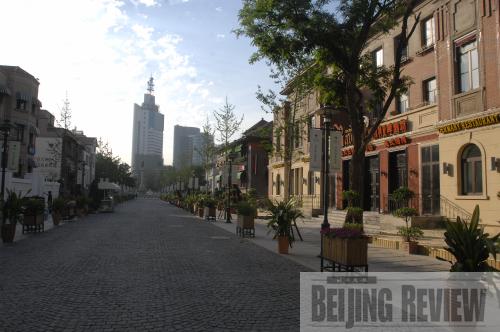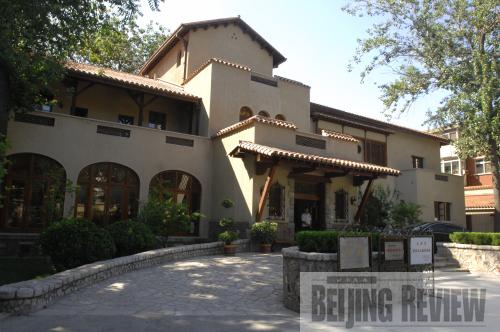|
 |
|
LITTLE ITALY: A Tianjin street with more than 100 Italian-style buildings opened to tourists at the beginning of 2009 after the city government spent 2 billion yuan ($294 million) on a massive renovation project (LU ZHONGMIN) |
Since the early 19th century, Tianjin, a port city 100 km southeast of Beijing, has played an important role in China's modernization. As one of the earliest ports opened to international trade, the city has been a cradle of China's modern industries. It is also among the country's earliest industrialized cities.
Tianjin is where China built its first railway, first shopping mall and first university. After the People's Republic was founded in 1949, the city made New China's first bicycle, first watch and first TV set.
 |
|
EMPEROR'S HOME: Tianjin's Jingyuan Garden, the residence of China's last emperor, Puyi, from 1927 to 1931, is now a museum on Puyi's life (LU ZHONGMIN) |
Various styles of architecture built over a thousand years coexist side by side in Tianjin. One of the earliest buildings is the Buddhist Dule Temple, which was built in 984. Over 60 percent of the buildings went up between 1900 and 1937. The city is also home to a large collection of foreign architectural styles since international concessions were set up there after China's 1860 defeat in the Second Opium War.
These exotic villas have helped to shape the city's cultural identity as a place where East meets West. This kaleidoscopic architecture also helped Tianjin earn the nickname of "a museum of world architecture."
Ang Lee, who won the Venice Film Festival's Golden Lion Award for directing the movie Lust, Caution, said the movie should have included shots of Tianjin, "where old architecture is well preserved and kept intact," though it was set in Shanghai in 1942. Lee regretted not including Tianjin's views due to tight shooting schedules.
Heritage protection
People in Tianjin have realized the importance of protecting the city's precious history and have written historical building protection into local laws.
Many celebrities and state leaders once lived in Tianjin. Puyi, the last emperor of China's Qing Dynasty (1644-1911), moved to Jingyuan Garden on Anshan Road in Heping District in 1927, three years after being evicted from the Forbidden City in Beijing. The residence built in 1921 was the last emperor's home between 1927 and 1931, before he left for the country's northeast to become the figurehead of a regime manipulated by Japan. The garden home has two two-story Western-style villas as its main buildings. There are three yards and a recreational area with a tennis court.
Over the eight decades since the departure of the last emperor, the garden's ownership has changed several times. It was used as office buildings and workers' dormitories. After a major earthquake in July 1976 in nearby Tangshan, the courtyards were crowded with makeshift tents set up by people who were afraid to stay in their homes for fear of aftershocks.
Jingyuan Garden soon became home to 45 families who added an extra 500 square meters of buildings for their use. But on September 1, 2005, the Standing Committee of the Tianjin Municipal People's Congress adopted a regulation that protected the city's historical buildings. It was China's first law set up to protect historical buildings. In October, families living in Jingyuan started to move out after the government announced it would renovate the grounds.
| 